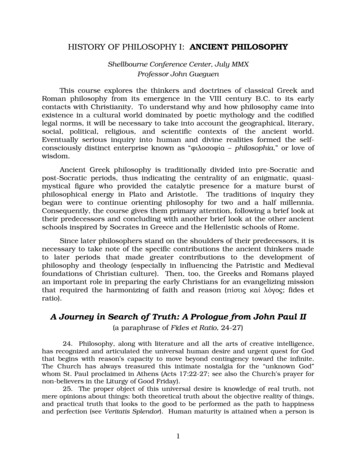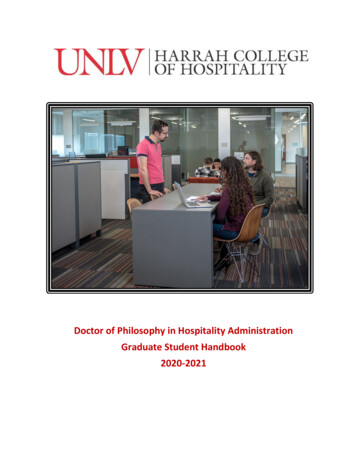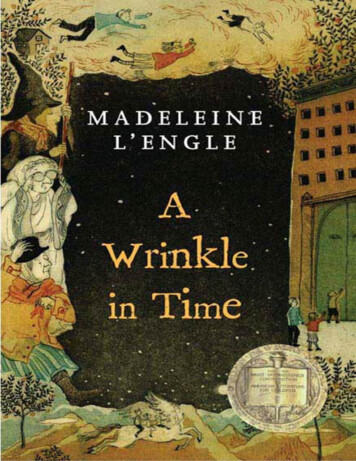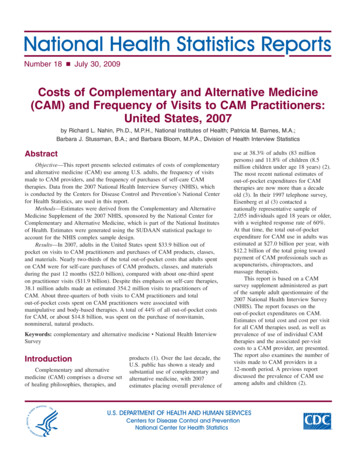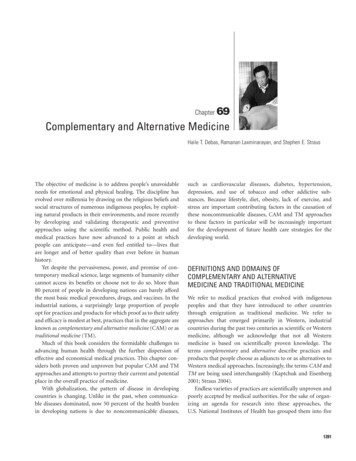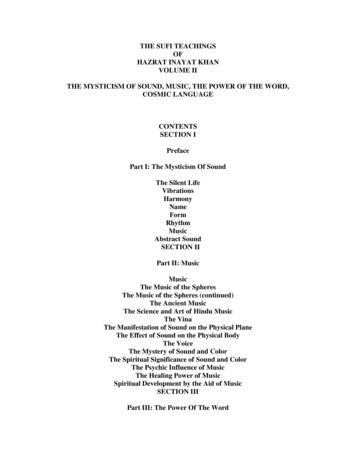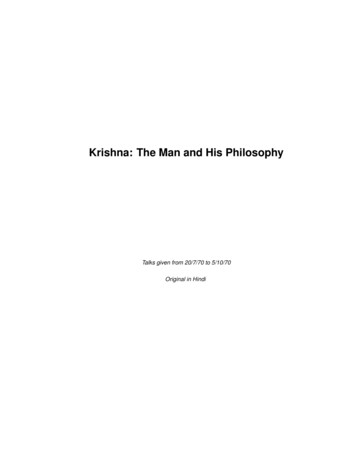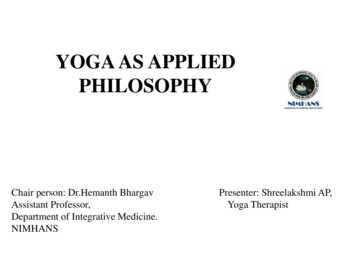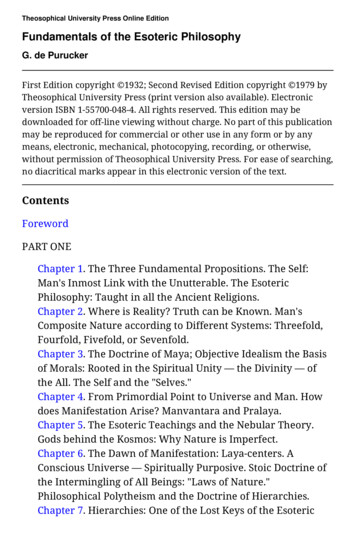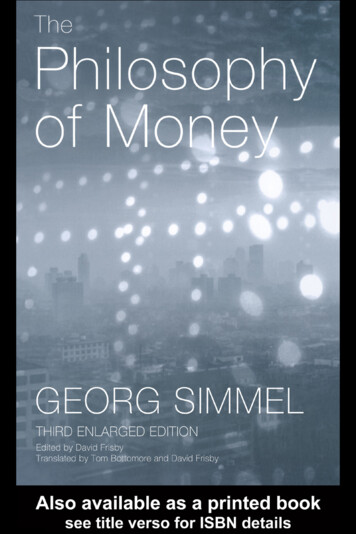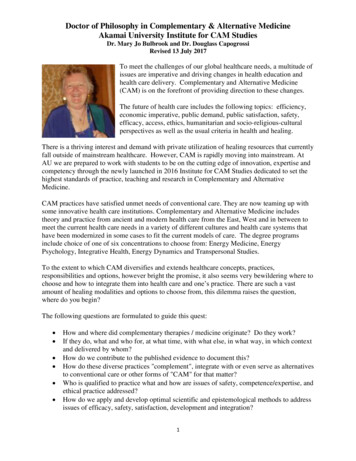
Transcription
Doctor of Philosophy in Complementary & Alternative MedicineAkamai University Institute for CAM StudiesDr. Mary Jo Bulbrook and Dr. Douglass CapogrossiRevised 13 July 2017To meet the challenges of our global healthcare needs, a multitude ofissues are imperative and driving changes in health education andhealth care delivery. Complementary and Alternative Medicine(CAM) is on the forefront of providing direction to these changes.The future of health care includes the following topics: efficiency,economic imperative, public demand, public satisfaction, safety,efficacy, access, ethics, humanitarian and socio-religious-culturalperspectives as well as the usual criteria in health and healing.There is a thriving interest and demand with private utilization of healing resources that currentlyfall outside of mainstream healthcare. However, CAM is rapidly moving into mainstream. AtAU we are prepared to work with students to be on the cutting edge of innovation, expertise andcompetency through the newly launched in 2016 Institute for CAM Studies dedicated to set thehighest standards of practice, teaching and research in Complementary and AlternativeMedicine.CAM practices have satisfied unmet needs of conventional care. They are now teaming up withsome innovative health care institutions. Complementary and Alternative Medicine includestheory and practice from ancient and modern health care from the East, West and in between tomeet the current health care needs in a variety of different cultures and health care systems thathave been modernized in some cases to fit the current models of care. The degree programsinclude choice of one of six concentrations to choose from: Energy Medicine, EnergyPsychology, Integrative Health, Energy Dynamics and Transpersonal Studies.To the extent to which CAM diversifies and extends healthcare concepts, practices,responsibilities and options, however bright the promise, it also seems very bewildering where tochoose and how to integrate them into health care and one’s practice. There are such a vastamount of healing modalities and options to choose from, this dilemma raises the question,where do you begin?The following questions are formulated to guide this quest: How and where did complementary therapies / medicine originate? Do they work?If they do, what and who for, at what time, with what else, in what way, in which contextand delivered by whom?How do we contribute to the published evidence to document this?How do these diverse practices "complement", integrate with or even serve as alternativesto conventional care or other forms of "CAM" for that matter?Who is qualified to practice what and how are issues of safety, competence/expertise, andethical practice addressed?How do we apply and develop optimal scientific and epistemological methods to addressissues of efficacy, safety, satisfaction, development and integration?1
CAM PhD Program by Coursework and ResearchRevised 13 July 2017 Where do professional regulation and appropriate business practices fit in?How are we to collaborate and communicate with one another when concepts andtechniques are so varied?How can the history of healing systems give us clues to the farther reaches of possibilityand development?How do we deepen and extend our current health practices?How should media and information resources for the public be planned, coordinated andintegrated into health care?All of these questions and more, demand critical reflection and systematic inquiry. AkamaiUniversity’s programs are strategically places to address them and provide leadership to thefuture of health and healing.What questions are of interest to you? They ARE the kind of questions we encourage you toexplore with us through our degrees and certificate diploma programs in our School of CAM atAkamai University.We welcome you and will do whatever we can to make your journey of development, learningand discovery an enjoyable one!We hope you join Akamai University’s CAM Program!Dr. Mary Jo Bulbrook, BSN,, RN, MEd., EdD, CEMP/S/I, HTCP & InstructorProgram Director, Complementary & Alternative Medicine (CAM)1.919.381-4198 work / 1.919.923.2409 cellmaryjo@energymedicinepartnerships.comTARGET AUDIENCECAM program is designed to serve the needs of a broad array of health care practitioners,(doctors, nurses, psychologists, mental health professionals, social workers, counselors,paramedics) energy based practitioner of all persuasions and scholars.Akamai University respects the training completed at quality CAM institutions, such as thoselisted in the chart shown below. Training completed from these recognized CAM trainingprograms are highly desired, and can be applied toward important elements of the majorconcentration requirement for the Akamai Doctoral Program. An analysis of a students priortraining in CAM is required for those students who have studies or practiced extensively in theCAM field. Concentrations are available in the following areas: Energy Medicine, EnergyPsychology, Energy Kinesiology, Energy Dynamic, Transpersonal Studies and IntegrativeHealth. Samples of training programs accepted toward graduate work includes the following butare not limited to the list below.2
CAM PhD Program by Coursework and ResearchRevised 13 July 2017CAM PROGRAM FACULTY Mary Jo Bulbrook, EdD, RN, BSN, MEd, CEMP/S/I, HTCPDean of the Institute of CAM StudiesComplementary and Alternative Medicine Program DirectorPrimary focus: International Practice & Teaching CAM Worldwide & Relationship withIndigenous HealersMelinda Connors, PhD, Energy Medicine, Deputy Director of CAM Program, CAMResearchJames L. Oschman, Ph.D., Energy MedicineNick Arrizza, MD, Energy PsychiatristCorina Guethlin, Dipl.Psych., Ph.D., Complementary MedicineDan Benor, MD, Energy Psychology PsychiatristChristopher K. Johannes*, BA, MA, M.Ed. Ph.D., D.Sc. DHM, HD (R.Hom), D.Hom., NCC,LPC, RPP, MARH, TFT Dx., Integral Health StudiesBeverly Rubik, Ph.D, Energy ResearchRonald Boivin, Ph.D., Energy Psychology, Energy MedicineJoel P Bowman, Ph.D., Energy PsychologyOwen Owunwain, Ph.D., Energy Psychology, Energy Medicine, Complementary TherapiesChristina Ross, PhD, Energy Medicine, Energy Dynamics, Integrative Health, ResearchRobert Maladonado, PhD. Energy Medicine, Energy Dynamics, Integrative HealthKimberly Burnham, PhD, Energy Medicine, Integrative HealthDouglass Capogrossi, PhD, Energy Medicine, ResearchLeslie Whitcomb, PhD, Eco-therapyEster Coronel De Iberikleid, PhD, Energy Psychology, Energy MedicineENTRY REQUIREMENTSAs prerequisites for acceptance to the Doctor of Philosophy program, applicants should havecompleted the equivalent of a recognized Master’s degree in an appropriate field of study andhave several years of meaningful professional experience. Applicants admitted missing someelements of preparation must complete the missing elements as part of the initial program ofstudies at the doctoral level. These elements of preparation are discussed in the Master ofScience program overviewApplicants are expected to be proficient in collegiate English language skills and are expected tohave access to a computer, email and the Internet, and outside library resources for the full extentof their program.Completed training from a recognized practitioner program is highly desired, and can be appliedtoward the diploma or used as elements of the major concentration for the Doctor of Philosophyin Complementary and Alternative Medicine. Some higher level programs of training areeligible for transfer for credit as part of the requirements for the major concentration discussedbelow.3
CAM PhD Program by Coursework and ResearchRevised 13 July 2017DEGREE REQUIREMENTSStudents in the Doctor of Philosophy in Complementary and Alternative Medicine (CAM) willcomplete a minimum of 52 credits above the Master’s level including comprehensiveexaminations and a dissertation or major scholarly project. The coursework requirements includethe academic major, the major concentration, research preparation, the dissertation or majorscholarly project, and additional electives, as needed, to satisfy the minimum qualityexpectations.The finishing activities for doctoral students include completion of a comprehensive examinationat the conclusion of the academic coursework; preparations of a formal dissertation (or project)proposal, complete the dissertation (or major scholarly project), and preparation of themanuscript for faculty review. Doctoral students also complete an oral review of dissertation (orproject) after the review of the physical manuscript.The Doctoral degree expectations include the following elements of 52 credits above theMaster’s degree:Core Elements of Academic Major (Required: 18 credits minimum)Major Concentration (Required: 12 credits minimum)Research Preparation (Required: 6 credits minimum)Comprehensive Examination (Required: 2 credits)Dissertation Proposal (Required: 4 credits)Dissertation Project (Required: 8 credits)Oral Review of Thesis (Required: 2 credits)CORE COMPETENCIES (the following 18 credits)Doctoral students in CAM must complete 18 graduate credits in core coursework comprising anacademic major or the equivalent from another institution. These are the foundationalcompetencies in theories, principles, practices, research, historical, philosophical, and socialcultural implications of the complementary medicine. These courses represent the corecompetencies and essential elements, which define your field of study and establish theunderlying foundations upon which you may base your advanced professional development.Required: (18 credits) CAM 600: Advanced Readings in CAM (3 credits)CAM 601: Advanced Essentials of CAM (3 credits)CAM 502: Optimal Integral Health (3 credits)CAM 530: Anatomy & Physiology of the Human Energy System (3 credits)CAM 525: Touch Healing Ethics for Practice & Teaching (3 credits)CAM 771: Directed Professional Studies in CAM (3 credits)4
CAM PhD Program by Coursework and ResearchRevised 13 July 2017MAJOR CONCENTRATION (Required: 12 credits from one concentration)Doctoral participants complete a major concentration comprised of 12 credits of specializedstudies selected from one the following fields of inquiry:Energy MedicineEnergy PsychologyEnergy KinesiologyEnergy DynamicsTranspersonal StudiesIntegrative HealthEnergy Medicine (Students in this concentration select 12 credits)CAM 506: Theories, principles and Practices of Holistic Health (3 credits)CAM 507: Cross-cultural Traditional Healing Practices in Counseling& Psychotherapy (3 cr)CAM 508: Integral Healthcare (3 credits)CAM 526: Directed Intentionality, Prayer and Distance Healing (3 credits)CAM 529: Preventative Medicine (3 credits)CAM 540: Program Planning for CAM (3 credits)CAM 560: Advances in CAM (3 credits)CAM 751-759: Field Study in CAM (3 credits)CAM 780: Specialty Theory & Application (3 credits)CAM 781: Specialty Practicum (3 credits)CAM 782: Specialty Special Project (3 credits)CAM 783: Specialty Directed Study (3 credits)Energy Psychology (Students in this concentration select 12 credits)CAM 506: Theories, Principles and Practices of Holistic Health (3 credits)CAM 507: Cross-cultural Traditional Healing Practices in Counseling& Psychotherapy (3 cr)CAM 510: The Embodied Mind (3 credits)CAM 526: Directed Intentionality, Prayer and Distance Healing (3 credits)CAM 528: Parapsychology and Transpersonal Psychology: (3 credits)CAM 540: Program Planning for CAM (3 credits)CAM 551: Spiritual Health and Healing (3 credits)CAM 552: Neurolinguistic Programming (NlP) Theory & Practice (3 credits)CAM 553: Hypnosis Theory & Practice (3 – 6 credits)CAM 559: Innovative & Unconventional Approaches to Psychotherapy (3 credits)CAM 560: Advances in Energy Medicine (3 credits)CAM 561: Mind Resonance Process (3 credits)CAM 563: Child Development in Applied Eco-psychology (3 credits)CAM 577: Essentials of Energy Psychology (3 credits)CAM 578: Mind-Body Medicine I: Clinical Health Psychology (3 credits)CAM 579: Mind-Body Medicine II: Behavioral Medicine & Psychoneuroimmunology (3 cr )CAM 580: Mind-Body Medicine III: Integral Healthcare (3 credits)CAM 588: Psychology of Global Citizenship (2-3 credits)CAM 661: CAM Self Care (3 credits)CAM 662: Complementary Therapies Clinical Application (3 credits)CAM 663: Specialist Training CAM (3 credits)CAM 751-759: Field Study in CAM (3 credits)CAM 780: Specialty Theory & Application (3 credits)5
CAM PhD Program by Coursework and ResearchRevised 13 July 2017CAM 781: Specialty Practicum (3 credits)CAM 782: Specialty Special Project (3 credits)CAM 783: Specialty Directed Study (3 credits)Energy Kinesiology (Students in this concentration select 12 credits)CAM 506: Theories, Principles and Practices of Holistic Health (3 credits)CAM 507: Cross-cultural Traditional Healing Practices in Counseling& Psychotherapy (3)CAM 508: Integral Healthcare (3 credits)CAM 529: Preventative Medicine (3 credits)CAM 533: Essentials of Qi Gong (3 credits)CAM 540: Program Planning for CAM (3 credits)CAM 551: Spiritual Health and Healing (3 credits)CAM 560: Advances in CAM (3 credits)CAM 578: Mind-Body Medicine I: Clinical Health Psychology (3 credits)CAM 588: Psychology of Global Citizenship (2 credits)CAM 661: CAM Self Care (3 credits)CAM 662: Complementary Therapies Clinical Application (3 credits)CAM 663: Specialist Training CAM (3 credits)CAM 751-759: Field Study in CAM (3 credits)CAM 780: Specialty Theory & Application (3 credits)CAM 781: Specialty Practicum (3 credits)CAM 782: Specialty Special Project (3 credits)CAM 783: Specialty Directed Study (3 credits)Energy Dynamics (Students in this concentration select 12 credits)CAM 503: Principles of Naturopathy (3 credits)CAM 504: Overview of Complementary & Alternative Medicine (3 credits)CAM 506: Theories, Principles and Practices of Holistic Health (3 credits)CAM 510: The Embodied Mind (3 credits)CAM 522: Traditional Medicine (3 credits)CAM 523: Herbal Medicine (3 credits)CAM 524: Natural Medicine (3 credits)CAM 526: Directed Intentionality, Prayer and Distance Healing (3 credits)CAM 527: Therapy by Light Biophotonic Fundamentals of Complementary Therapies (3)CAM 528: Parapsychology and Transpersonal Psychology: (3 creditsCAM 529: Preventive Medicine (3 credits)CAM 531: Nutritional & Dietary Healing (3 credits)CAM 533: Essentials of Qi Gong & other Movement Therapies (3 credits)CAM 540: Program Planning for CAM (3 credits)CAM 542: Ayurveda I (3 credits)CAM 543: Ayurveda II (3 credits)CAM 544: Ayurveda III (3 credits)CAM 546: Herbal Immune System Enhancement (3 credits)CAM 547: Herbal Internal Cleansing (3 credits)CAM 548: Homeopathic Medicine I: Materia Medica, Laws and Principles (3 credits)CAM 549: Homeopathic Medicine II: Repertory, Case Taking and Applied Practice (3)6
CAM PhD Program by Coursework and ResearchRevised 13 July 2017CAM 551: Spiritual Health and Healing (3 credits)CAM 561: Mind Resonance Process (3 credits)CAM 563: Child Development in Applied Eco-psychology (3 credits)CAM 661: CAM Self Care (3 credits)CAM 662: Complementary Therapies Clinical Application (3 credits)CAM 663: Specialist Training CAM (3 credits)CAM 751-759: Field Study in CAM (3 credits)CAM 780: Specialty Theory & Application (3 credits)CAM 781: Specialty Practicum (3 credits)CAM 782: Specialty Special Project (3 credits)CAM 783: Specialty Directed Study (3 credits)Transpersonal Studies (Students in this concentration select 9 credits or related creditsincluding transfer:CAM 555: Shamanism (3 credits)CAM 581: Fundamentals of Transpersonal Studies (3 credits)CAM 582: Wisdom Traditions: World Religions (3 credits)CAM 583: Human Development: Transpersonal Perspectives (3 credits)CAM 584: Personal Mythology and Dreamwork (3 credits)CAM 585: Consciousness & Sexuality (3 credits)CAM 586: Cross-cultural Consciousness & EthicsCAM 587: Consciousness & Healing (3 credits)CAM 589: Paradigms of Consciousness (3 credits)CAM 590: Qualitative Research for CAM (3 credits)CAM 591: Consciousness & Creativity (3 credits)Integrative Health (Students in this concentration select 9 credits or related creditsincluding transfer:CAM 563: The Integrative Model and Philosophy of Self, Culture, and Nature (3 credits)CAM 564: Integrative Healthcare & Lifestyle (3 credits)CAM 565: Integrative Psychology (3 credits)CAM 566: Historical Perspectives on the Body (3 credits)CAM 567: Somatics in Multicultural Perspectives (3 credits)CAM 568: Integrative Health and the Future of Healthcare (3 credits)CAM 569: Spirituality and Awareness of Cult Dangers (3 credits)Description of CAM 780-783: External Training in CAM Directed Study (3 - 9 credits)Students pursue special "external" training via an approved CAM training course offered atanother accredited and approved institution during or prior to entrance at Akamai University.An example would be professional courses (often for entry-level or continuing professionaldevelopment and education certification) in Healing Touch (HT), Tapas Acupressure Technique(TAT), Emotional Freedom Technique (EFT), Transform Your Life through Energy Medicine(TYLEM), Touch For Health (TFH), Energy Kinesiology, Polarity Therapy, Wholistic HealingEffective and Effortless (WHEE), Neuro Linguistic Programing (NLP), Thought Field Therapy,Aromatherapy, Acupressure, Hypnotherapy, Reflexology, Yogi, Qigong, Mysticism, Buddhism,7
CAM PhD Program by Coursework and ResearchRevised 13 July 2017or Reiki. These recommendations of qualified training are under the collaborative supervision ofqualified faculty from training sponsors, as appropriate.These course options are intended to allow students to add significantly to their advancedknowledge in the discipline through applied practical energy based training under the leadershipof qualified individuals and organizations. Additional documentation may be necessary todetermine the current knowledge base of the applying student through interview, submitteddocumentation and / or additional course work.Students begin the course of determining appropriate transfer credits with the preparation of abrief training proposal and identification of selective course work and training materials insupport of the training. Approved training requires a completion certificate or letter of affidavitfrom the trainer or training organization. Training may also take the form of an on-the-jobtraining, on-site internship, an apprenticeship or other formal or semi-formal training activityincluding professionally presented seminars, conferences, workshops, symposia and retreats thatcan document partial or all credits to be usedRESEARCH PREPARATION (6 CREDITS)Doctoral students must pursue studies providing advanced research knowledge necessary forsuccess in their final projects (dissertation or major project in lieu of dissertation). At least threesemester credits of research preparation coursework is required and this might focus uponquantitative and qualitative methods or participatory action research techniques including subjectselection, research design, and statistical analysis, as appropriate to each student’s proposedproject. Through this requirement, students learn to effectively define applied problems ortheoretical issues and articulate the rationale for the study. They should learn to present aneffective scholarly review of the academic literature and implement quantitative, qualitative orparticipatory action methods for evaluating academic issues.Required (6 credits required):RES 591: Research Basics for Evaluating CAM* (3 credits)RES 699: Research in CAM* (3 credits)COMPREHENSIVE EXAMINATION EXM 980 REQUIRED (2 CREDITS)Once students have completed the coursework elements of their degree, they will be asked toschedule the Comprehensive Examination. The primary mentor and a faculty memberrepresenting the secondary academic area conduct both the written and oral components of theexamination. The written portion is open book style with selected
The degree programs include choice of one of six concentrations to choose from: Energy Medicine, Energy . programs are highly desired, and can be applied toward important elements of the major . Parapsycho
